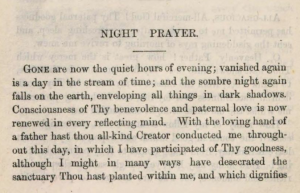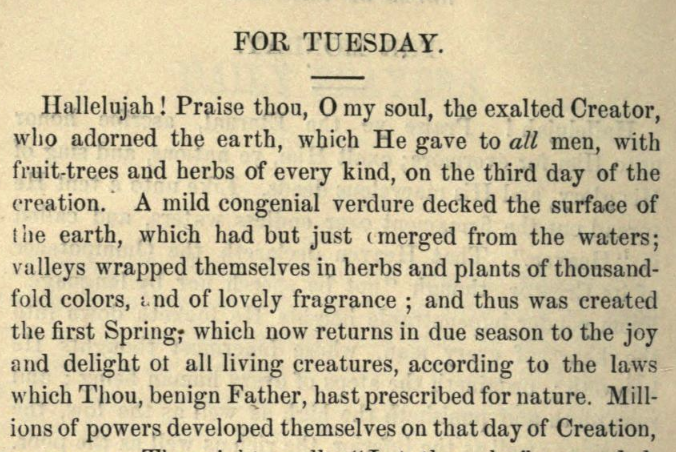Contributor(s): Shared on: 11 June 2020 under the Creative Commons Zero (CC 0) Universal license a Public Domain dedication Categories: Tags: | Contribute a translation | Source (English) |
|---|
|
Gone are now the quiet hours of evening; vanished again is a day in the stream of time; and the sombre night again falls on the earth, enveloping all things in dark shadows. Consciousness of Thy benevolence and paternal love is now renewed in every reflecting mind. With the loving hand of a father hast thou all-kind Creator conducted me throughout this day, in which I have participated of Thy goodness, although I might in many ways have desecrated the sanctuary Thou hast planted within me, and which dignifies mankind. Forgiving and pardoning art Thou, O God, to Thy devoted servants, a forgiving and indulgent father wilt Thou be to me also at all times. Yea, O heavenly Parent, I trust in Thy mercy and grace, in the hope that Thou wilt endow me with energy to improve my walk in life, and courage to resist the allurements of sin. O, may the evening of every day bear testimony that I have not failed to profit by Thy manifold bounties as seed for eternity, so that I may lay my head on my pillow in tranquility and confidence, and awake again to renewed joy in Thy blessing. | |
To Thy hand, “O Keeper of Israel who neither sleepeth nor slumbereth,” do I commit my spirit; mayest Thou strengthen it anew, so that it may always act according to Thy will, and be received by Thee with grace when its mortal covering shall be summoned to eternal sleep. Amen. |
Source(s)
 Marcus Heinrich (also Mordecai Ḥayyim/Hyman/Heyman) Bresslau (ca. 1808-15 May 1864) was a Hebraist and newspaper editor. Born in Hamburg, he settled in England when young. For some time from 1834 he was Baal Ḳoreh (reader) at the Western Synagogue. He then taught Hebrew at the Westminster Jews’ Free School and went on to tutor privately. A maskil, he became involved with M. J. Raphall’s Hebrew Review and Magazine of Rabbinical Literature (1834-6). In October 1844 he was appointed editor of the relaunched Jewish Chronicle by proprietor Joseph Mitchell. Prickly and quarrelsome, he resigned in July 1848 but returned in around September. He remained until about October 1850. After Mitchell’s death in June 1854 he became proprietor (his middle name appearing as Heyman) and edited it until February 1855 when new proprietor Abraham Benisch succeeded him. Bresslau, who tried vainly to revive the Hebrew Review, wrote Hebrew poetry, produced a Hebrew grammar and a Hebrew dictionary, and translated various Hebrew manuscripts in the Bodleian Library. Bresslau compiled (we think) the first compilation of teḥinot in English for women. (Much of this information via Bresslau's entry in The Palgrave Dictionary of Anglo-Jewish History) Aharon Varady (M.A.J.Ed./JTSA Davidson) is a volunteer transcriber for the Open Siddur Project. If you find any mistakes in his transcriptions, please let him know. Shgiyot mi yavin; Ministarot naqeni שְׁגִיאוֹת מִי־יָבִין; מִנִּסְתָּרוֹת נַקֵּנִי "Who can know all one's flaws? From hidden errors, correct me" (Psalms 19:13). If you'd like to directly support his work, please consider donating via his Patreon account. (Varady also translates prayers and contributes his own original work besides serving as the primary shammes of the Open Siddur Project and its website, opensiddur.org.) Read a comment / Leave a comment (moderated) Works of related interest: |












Leave a Reply